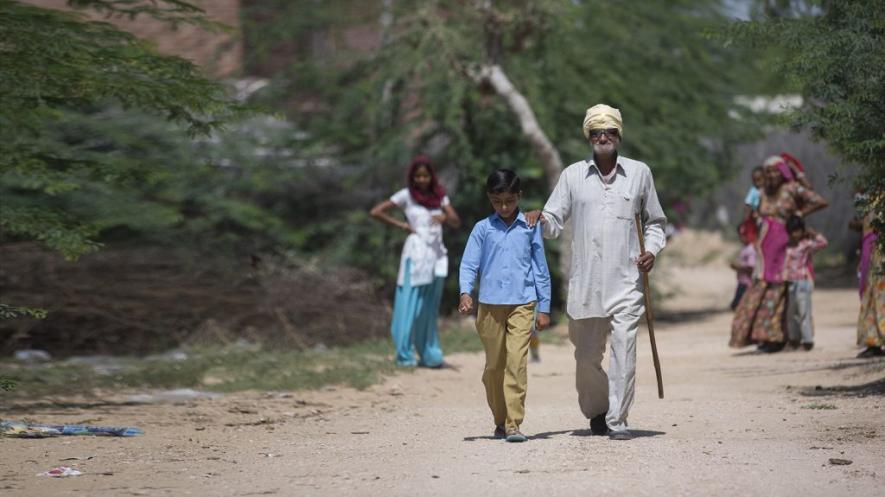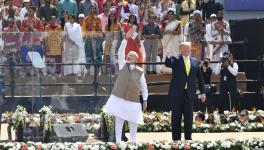War on Coronavirus Becoming Assault on Marginalised

Image use for represantional only. Image courtesy: Sightsavers
Prime Minister Narendra Modi’s announcement of a 21-day lockdown is a declaration of war against an invisible enemy—the Novel Coronavirus. But what does a war entail? What enables a state to declare war? And how does war relate to securitisation? To unravel the biopolitics of this pandemic, how it has laid bare the characteristics of a securitised state, is of immediate importance.
The lockdown across India has come without any financial support to the majority of the populace who work in the unorganised sectors. So an absolute lockdown, clearly, is a war against people. Can we refer to those whom we wage war against as “our” people? When we don’t just practice but also celebrate social distancing, and, accordingly, close the gates of our Savarna-dominated housing enclaves, leaving others to live or die in slums, we are waging a war against the marginalised.
This is also a war against humanity, for those who have hoarded goods enough to live on are enjoying the privilege of isolation, and applauding the police for beating up daily-wage earners out in search for food. In these and other ways, confronting the Covid-19 pandemic will bring in some irreversible social mechanisms that will sharpen India’s social cleavages and deepen existing malaises. This war threatens to expose a majority of the population to a crisis even more severe than even the virus; that is, hunger, poverty, malnutrition and untouchability—not just its euphemism, “social distancing”.
Social distance is a persistent reality, not a temporary strategy
No doubt, banning social interaction, as Modi has repeatedly said, is the only plausible way to slow the spread of the pandemic. Yet, the vocabulary of ‘social distancing’ still needs scrutiny considering India’s caste cleavages which determine its social and political order.
Social distancing is an everyday phenomenon in a country where touchability and untouchability shape the discursive context of Savarna-Dalit relations. For example, separate utensils for house help is not a new phenomenon here, but enforced social distancing threatens to solidify these and worse, more persistent, forms of untouchability—such as the social ‘othering’ of Dalits, Muslims, women and non-Savarnas in general.
The recent accounts of home workers, in which they are expressing their anger and chagrin over being suspected by their employers as carriers of Covid-19 are already doing the rounds. The risk India now faces is of concerns over ‘pure’ and ‘impure’ habits and customs getting exaggerated. It is likely that the caste connotation of ‘touchability’ and ‘untouchability’ will fix new vocabularies of what is sanitised and what is unsanitised. In other words, social distancing is not an exceptional state of being in India, and enforcing it will make social exclusion and cruelty worse.
The Italian philosopher, Giorgio Agamben, has said in a recent essay, in the context of Italy’s new emergency measures to Covid-19, that the response to the pandemic has weaponised the State to use a medical legitimacy as a ruse. He wrote in Il Manifesto recently [translated], “...what is once again manifest here is the growing tendency to use the state of exception as a normal governing paradigm. The executive decree (decreto legge), approved by the government ‘for reasons of hygiene and public safety,’ produces a real militarisation ‘of those municipalities and areas in which there is at least one person who tests positive and for whom the source of the infection is unknown, or in which there is a least one case that is not connected to a person who recently traveled from an area affected by the contagion’.”
To bring this to India’s context, the new caste order calls for gated communities to close themselves from their domestic help and labourers. There is an ongoing effort to enforce absolute sanitation without consideration or introspection into how such deep and long-lasting isolation is a marker of a privileged life.
The security state as a quarantining machine
The vocabulary of social distancing goes hand-in-hand with the medically-sanctioned imposition of a masculine and protectionist security state. Chandra Talpade Mohanty, a distinguished professor of gender and women’s studies at the University of Syracuse, notes in a recent paper in the EPW that a “National Security State” or a securitised regime typically uses connected strategies of “militarisation, criminalisation and incarceration to exercise control over particular populations, thus remaking individual subjectivities and public cultures”.
Consider the strategies being adopted to fight the invisible biological enemy. They are actually very similar to the strategies of a securitised regime to counter other kinds of enemies. People are being asked to self-quarantine—a sort of incarceration at home, a violation of which can cost a hefty fine or imprisonment. The normalisation of lathi-charge by police on those found outdoors is almost complete. The police are, by now, a perfect instrument for a state going rogue—it refuses to consider any exigency necessary enough as it cracks down on anybody it catches sight of. Thousands have been detained for being outdoors during the lockdown, and this is being celebrated through the Indian media.
What does this signify? What kind of society does India have? A few days back, the same police, with absolutely impunity, vandalised universities, dismantled peaceful democratic protests and has been accused of actively and silently aiding and abetting the Delhi violence. Further militarisation will only mean greater police impunity. A lathi-charge, at the very least, will become a normative way to discipline subjects.
Bio-militarisation: policing in the days of Covid-19
American feminist author Cynthia Enloe says in her book, Globalization and Militarism: Feminists Make the Link, that the militarisation of everyday life is a hallmark of the “neo-liberal empires and national security states” of our time. From the spectacular presence of police forces to dismantle the anti-CAA protestors—the internal enemy—to lathi-wielding police fighting an invisible biological enemy by combating its prospective carriers, we have traversed a path that leads to an militarised everyday. This is similar to what Mohanty has called the “bio-militarisation of the body”.
In Mohanty, bio-militarisation implies that a “body that must survive under conditions of perpetual control and surveillance is subject to the constant material and symbolic violence enacted by the state, and lives in constant fear of being arrested or incarcerated”. As each of us is a prospective carrier of the virus, our bodies are a battlefield where quarantining, self-isolation and servile surrender to what the state dictates are our weapons, also against ourselves.
In this war against an invisible enemy, every citizen and prospective non-citizen is a suspect. Every human body is to be put under surveillance, every action is disciplined, everyone ‘Othered’. This ambiguous reality also breeds racism, as the abuse of students and others from the north-eastern states shows us. Such fanaticism, as I have argued elsewhere, has established Covid-19 as the “(im)moral force” that drives our supremacism.
Covid-19 has become a tool to wage war against differences, against anything that does not suit the notion of a homogenous Hindu nation. Thus there is another war going on, in which only a blurred line stands between the military and the civilian, both fulfilling their objectives with impunity, both armed with protectionist masculinity. Both are ‘saviours’ of the nation from the Others—the marginalised, the poor, the Dalits, Muslims, the dissenters and protesters, women, the Queer, the residents of north-eastern states, and so on.
This war also calls for a battle against an 'enemy' who can take on any body, shape or form. The enemy is deployed to reproduce masculine protectionism. The enemy is required to evoke the sense of imagined nationalism and forced integrity. So, while a few privileged isolate themselves in their comfort zones, the language of war must be resisted. Instead of “war” we should think of using words like solidarity, empathy and collective resistance. This change would signal that we are headed towards a moral victory against any social or political malise.
The author is a doctoral research fellow at the School of Liberal Studies, Ambedkar University, Delhi.
Get the latest reports & analysis with people's perspective on Protests, movements & deep analytical videos, discussions of the current affairs in your Telegram app. Subscribe to NewsClick's Telegram channel & get Real-Time updates on stories, as they get published on our website.
























